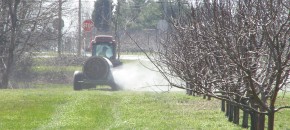Last summer a pepper differential trial was done near Vineland, NJ to help determine if new races of bacterial leaf spot (BLS) were present in the area. At least 11 races of BLS have been identified to date. …look at ways to detect the presence of BLS susceptibility on your farm. Run your own internal […]
Continue reading...Understanding Damping-off Pathogens
Damping-off is caused by a number of important vegetable pathogens and is very common during transplant production and early-spring. Damping-off can kill seedlings before they break the soil line (pre-emergent damping-off) or kill seedlings soon after they emerge (post-emergent damping-off). Common pathogens that cause damping-off include Pythium, Phytophthora, Rhizoctonia and Fusarium spp. It is extremely […]
Continue reading...Does a Harsh Winter = No Crop Pests?
It has been in the news, of course, about the severity of the 2013/2014 winter with record breaking low temperatures and higher than normal snow amounts in many locations. So how does all this translate to crop insect pests? As an article that I read last week said, “It’s complicated”. There are many factors that […]
Continue reading...Weed Control Considerations for Early Planted Peas
Peas are planted as early as ground can be worked in late February or early March in the mid-Atlantic states. Planting continues into late April to stagger the harvest. This is especially important for peas grown for processing. Peas planted later, in April, germinate and emerge quickly in the relatively warm soil, but early planted […]
Continue reading...Tree Fruit March Checklist

Oil for Pear Psylla and Scale Control Scout While Pruning Dormant Season Copper Sprays Dormant Season Urea Sprays Oil for Pear Psylla and Scale Control: During the recent warm up pear psylla adults were active, however no egg laying has yet been observed. Growers with pears should be thinking about oil applications to deter egg […]
Continue reading...Vegetable Production Recommendations and Organic Practices
Growers who chose to farm under organic conditions can find valuable information on cultural practices, variety recommendations, alternative pest management methods, and NOP approved products in the 2014 Commercial Vegetable Production Recommendations Guide. Note that people who apply pesticides for the purpose of raising an agricultural commodity, including organic farmers, need to be licensed as […]
Continue reading...